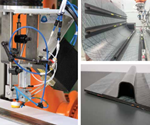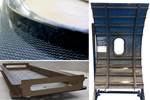Institut de Soudure Groupe optimizes production control for large-sized composite parts
Partnership with aerostructures supplier Duqueine installs thermography to reduce inspection time and cost.
Institut de Soudure Groupe (Villepinte, France) has introduced an innovative infrared (IR) thermography technology which is being rolled out for composites manufacturing via its Composite Integrity brand in Porcelette, France. This thermography-based technology, described as disruptive, uses the latest image processing systems and reduces production control times and costs for large composite structures by as much as 30% compared to conventional ultrasound testing (UT).
Composite Integrity is working with Duqueine Group (Massieux, France), a global aerospace tier supplier specialized in the design and manufacture of high-performance composite parts and sub-assemblies. The partners are working to qualify this new technology to replace ultrasonic testing and thereby reduce the cost of non-destructive testing (NDT) for the end client.
Duqueine parts will first be inspected in Composite Integrity’s NDT center in Porcelette. A second IR thermography inspection system will then be installed close to Duqueine’s production facility in Civrieux, in a new Institut de Soudure technology center. This fully automated technology is being integrated into the production environment by Pinette Emidecau Industries (PEI), and will be completed by September 2019.
This project has added thermography to the list of high-tech composites production control resources, such as water jet C-scan, already deployed by Composite Integrity, and augments its substantial expertise in composites production technologies, which includes welding of thermoplastic composites (see “Bespoke induction coils” in CW’s Sep 2018 feature “Welding thermoplastic composites”).
For more information, contact Jean-Hugues Duban, Communications Director
jh.duban@isgroupe.com
Related Content
-
Composites manufacturing for general aviation aircraft
General aviation, certified and experimental, has increasingly embraced composites over the decades, a path further driven by leveraged innovation in materials and processes and the evolving AAM market.
-
ASCEND program update: Designing next-gen, high-rate auto and aerospace composites
GKN Aerospace, McLaren Automotive and U.K.-based partners share goals and progress aiming at high-rate, Industry 4.0-enabled, sustainable materials and processes.
-
Cryo-compressed hydrogen, the best solution for storage and refueling stations?
Cryomotive’s CRYOGAS solution claims the highest storage density, lowest refueling cost and widest operating range without H2 losses while using one-fifth the carbon fiber required in compressed gas tanks.














.jpg;maxWidth=300;quality=90)
